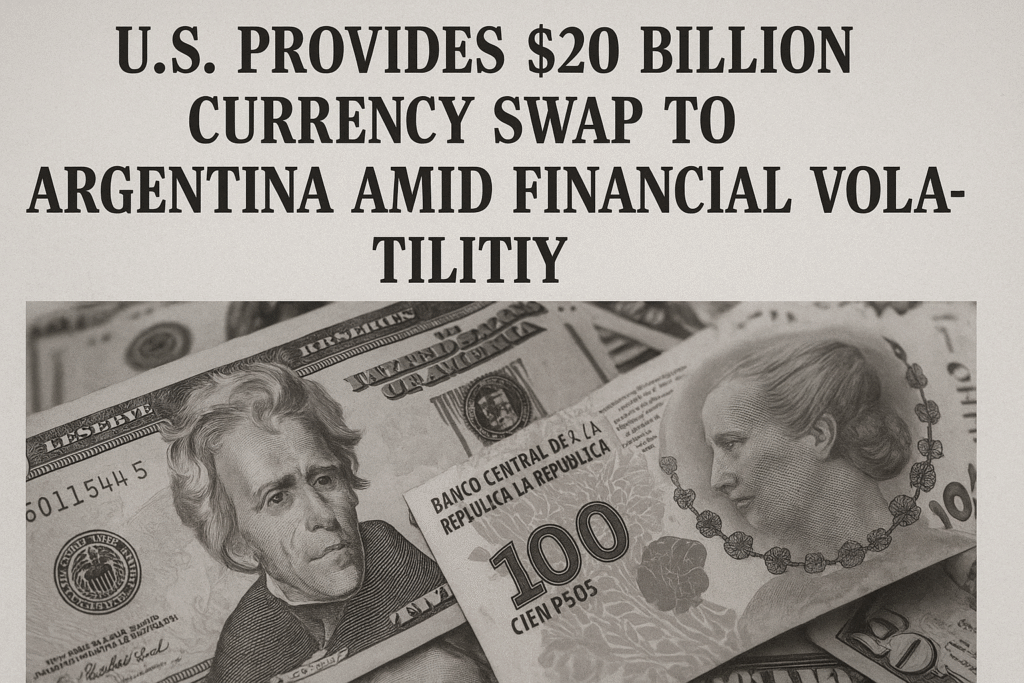By Harshit, WASHINGTON, D.C. — October 13, 2025
The U.S. Treasury Department has extended a $20 billion currency swap line to Argentina in a bid to stabilize the South American nation’s financial system and prevent potential ripple effects in global markets. Treasury Secretary Scott Bessent announced the intervention Thursday via social media platform X, describing the move as a response to “a moment of acute illiquidity” in Argentina’s financial system.
Swap Line to Stabilize the Peso
The currency swap agreement allows Argentina’s central bank to exchange volatile pesos for stable U.S. dollars, providing much-needed liquidity as the country approaches midterm elections on October 26. The injection is intended to halt a downward spiral in the peso and maintain confidence in Argentine credit markets.
“The U.S. support acts as a circuit breaker, halting the negative feedback loop that had threatened to deepen Argentina’s economic strain,” said Diego Celedon, head of equity strategy for Latin America at JPMorgan Chase. Following the announcement, the peso appreciated sharply against the dollar, reflecting initial market relief.
Economic and Political Stakes
While Argentina is not deemed a systemic threat to the global economy, experts say volatility in its markets could affect investor sentiment, capital flows, and commodity prices worldwide. The swap line marks the first intervention of this kind since the U.S. supported Mexico in 1995.
Joseph Brusuelas, chief economist at RSM, cautioned, “It’s entirely unclear that Argentina will not choose to devalue its peso after its election later this month. That remains one of the greater risks of providing a $20 billion Treasury-backed swap line.”
Political considerations also play a role: President Javier Milei, whose government has aligned with U.S. interests in the region, faces an election that will determine the administration’s future. Analysts note that maintaining stability in Argentina is strategically important for U.S. regional influence.
Mixed Market Reaction
Despite the peso’s initial strengthening, investor sentiment remains cautious. The Global X MSCI Argentina ETF, which tracks the country’s industrial leaders, fell on Friday, signaling concerns that the U.S. support may not be sufficient to fully stabilize markets.
“Milei has succeeded in sharply reducing inflation but has struggled to stabilize the peso’s exchange rate against the dollar,” said Lourdes Casanova, director of the Emerging Markets Institute at Cornell University. “Given that currency trading is the largest financial market in the world, no amount of reserves can single-handedly offset that pressure.”
Defending the Intervention
Treasury Secretary Bessent emphasized that Argentina’s fiscal reforms, which are expected to generate dollar-denominated exports and foreign exchange reserves, make the swap line a sound investment for U.S. interests. He added that the intervention could prevent financial instability from spilling over into U.S. markets.
However, critics, including Rohit Chopra, director of the Consumer Financial Protection Bureau, argued that the move diverts U.S. resources away from domestic priorities. “While the government is ‘shut down,’ the Treasury Department officially started its bailout of Argentina,” he said.
Despite the debate, Washington maintains that supporting Argentina is necessary to protect both regional stability and global financial markets.

